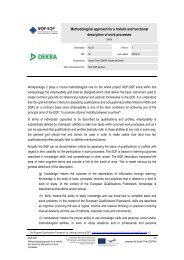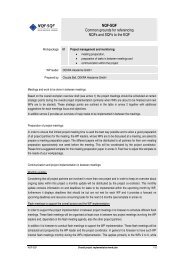Overview of National Qualification frameworks - Project-Nqf-Sqf
Overview of National Qualification frameworks - Project-Nqf-Sqf
Overview of National Qualification frameworks - Project-Nqf-Sqf
You also want an ePaper? Increase the reach of your titles
YUMPU automatically turns print PDFs into web optimized ePapers that Google loves.
At VET level <strong>of</strong> Spanish NQF , EQF levels are already related to NQF VET levels as shown previously. Although NQF Levelsare already referenced to EQF levels, it is not in use yet in practical procedures by organizations, educational bodies andsystems.Accreditation <strong>of</strong> Non University Studies:http://www.educacion.es/mecd/jsp/plantilla.jsp?id=64&area=titulosOnly <strong>Qualification</strong>s/Competences obtained via formal education studies can be accredited by the current formal system( Formal primary & secondary levels or similar).Accreditation <strong>of</strong> Non formal competences can be only recognized ( very recently) via The Real Decree 1224/2009 forCompetences Acquired via Labour Experience Recognition. The process is oriented to recognize and to certify competencesacquired by non formal education ways at a national level and is based on the NQF ( process described on the next topic). Asthis is a very recent system and it is under implementation, qualifications available to be recognized by the system varies a lotdepending on the contry region stage <strong>of</strong> the system implementation.Accreditation <strong>of</strong> University Studies:It is not a straight forward process yet as EQF objectives are meant to be:There are 2 different processes:__Homologation: Formal recognition <strong>of</strong> University Studies that entitle the applicant to follow the formal studies at this level inSpain. Any graduates can apply for approval <strong>of</strong> foreign higher education diplomas obtained abroad. The approval granted inSpain <strong>of</strong>ficial validity <strong>of</strong> higher education diplomas obtained abroad. An approved foreign degree has the same effects(academic or pr<strong>of</strong>essional) <strong>of</strong> the Spanish academic degree or qualification which is homologous throughout the country.These effects occur from the date it is granted and issued the corresponding credentials.For the approval to specific titles, the current academic degrees and Bachelor's Degree competent Department <strong>of</strong><strong>Qualification</strong>s and Recognition <strong>of</strong> <strong>Qualification</strong>s <strong>of</strong> the Ministry <strong>of</strong> Education. Approval <strong>of</strong> academic degrees and postgraduate(Masters and PhD) is the responsibility <strong>of</strong> Spanish University Rectors.In this ministry, you can request two types <strong>of</strong> approvals:· A Spanish university degree specifically included in the <strong>of</strong>ficial university catalog that is current and fullyimplemented in at least one Spanish university.· The degree <strong>of</strong> Diploma or Degree.__Recognition: Formal recognition <strong>of</strong> University Studies that entitle the applicant to work in Spain in certain areas: exampleArchitect, Psychologist etcCommunity rules <strong>of</strong> pr<strong>of</strong>essional recognition is based on the articles <strong>of</strong> the Treaty establishing the European Communitygoverning freedom <strong>of</strong> establishment and freedom to provide services. In order to give effect to this freedom, we have adopteda set <strong>of</strong> provisions implementing these provisions <strong>of</strong> the Treaty and set up a system <strong>of</strong> recognition <strong>of</strong> pr<strong>of</strong>essional qualificationsbetween the Member States <strong>of</strong> the Union.This specific legislation in Spain in the Royal Decree 1837/2008, <strong>of</strong> November 8 , Which is incorporated into Spanish lawDirective 2005/36/EC European Parliament and the Council <strong>of</strong> 7 September 2005 and Directive 2006/100/EC the Council <strong>of</strong>20 November 2006 concerning the recognition <strong>of</strong> pr<strong>of</strong>essional qualifications, as well as certain aspects <strong>of</strong> the exercise <strong>of</strong> thelegal pr<strong>of</strong>ession.The effects <strong>of</strong> this recognition are exclusively pr<strong>of</strong>essional, ie, lead to the authorization to practice a specific pr<strong>of</strong>ession in thehost State. The purpose <strong>of</strong> pr<strong>of</strong>essional recognition <strong>of</strong> qualifications is the overcoming <strong>of</strong> obstacles, especially those dealingwith qualifications, that citizens <strong>of</strong> a State can be found for access to exercise a pr<strong>of</strong>essional activity in another. The mainbeneficiaries are therefore not pr<strong>of</strong>essionals and students.This recognition <strong>of</strong> diplomas only applies to nationals· The 27 member states <strong>of</strong> the European Union: Germany, Austria, Belgium, Bulgaria, Cyprus, Denmark, Slovakia,Slovenia, Spain, Estonia, Finland, France, Greece, Hungary, Ireland, Italy, Latvia, Luxembourg, Lithuania, Malta, NetherlandsNetherlands, Poland, Portugal, United Kingdom, Czech Republic, Romania, Sweden.· The 3 states signing the agreement on the European Economic Area: Norway, Iceland, Liechtenstein.· Switzerland, under a bilateral agreement with the European Union.NQF-SQF:"This project has been funded with support from28/29<strong>Overview</strong> <strong>of</strong> <strong>National</strong> <strong>Qualification</strong>prepared by 3s research laboratory<strong>frameworks</strong>the European Commission. This publicationreflects the views only <strong>of</strong> the author, and theCommission cannot be held responsible for anyuse which may be made <strong>of</strong> the informationcontained therein."




